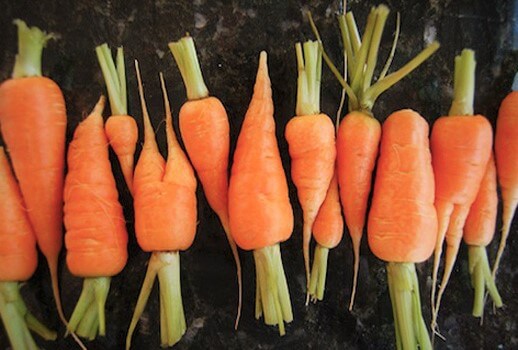Baby carrots were found in 1986 when a carrot farmer from California experimented to preserve many of the damaged and misshaped carrots in his farm. They are in fact less-than-perfect carrots, smaller size as they have been shaved down. To last much longer, they have been bathed in chlorine, and are high-priced than normal carrots. Because of to this, you need to use the natural whole carrots instead.
Carrots are extremely healthy vegetables, but they are so common that are often overlooked. Yet, they are now regaining popularity as they are commonly consumed as a snack food or in fresh vegetable juices, stews, and soups.

The US Department of Agriculture claims:
“Thought to be native to central or western Asia (likely Afghanistan), cultivated carrots first arrived in North America with the early Virginia colonists.
Carrots are an important member of the parsley family, which also includes celery, anise, and dill. Like many vegetables, the early history of carrots centered on various medicinal attributes thought suitable for curing a wide range of conditions and maladies.”
Namely, a medium-size carrot or half a cup chopped carrot provides:
- 210% of the average daily recommended amount of vitamin A
- 10% vitamin K
- 6% vitamin C
- 2% calcium
Carrots are extremely rich in vitamin A due to the beta-carotene, which is converted into vitamin A in the liver. The term carotene was devised in the early 19th century by a German scientist who crystallized beta-carotene from carrot roots.
Carrot seed oil is high in magnesium, folic acid, potassium, vitamin B6, copper, and thiamine. Yet, they are also high in sugar, so you should consume them in moderate amounts.
Yet, if consumed regularly, carrots prevent heart diseases and strokes and support the health of the bones and the nervous system. Scientists also claim that these vegetables can lower the risk of chronic diseases.
These are some of their health benefits:
Vision
The lack of vitamin A in the body might deteriorate the eye’s photoreceptors, causing vision issues, so the consumption of foods high in beta-carotene is extremely beneficial.
Anti-Inflammatory Properties
Carrot extracts have potent anti-inflammatory properties and their effects are comparable to the ones of anti-inflammatory drugs like Aspirin, Naproxen, Ibuprofen, and Celebrex.
Heart Disease
The consumption of more deep-orange-colored fruits and vegetables reduces the risk of coronary heart disease (CHD). Studies have shown that carrots are linked to a 32 percent lower risk of CHD, so researchers maintain that:
“… A higher intake of deep orange fruit and vegetables and especially carrots may protect against CHD.”
Plus, the consumption of carrots has been related to the reduced risk of heart attacks in women.
Brain Health
Researchers have found that the carrot extract is extremely useful in the case of cognitive dysfunctions, lowers cholesterol, and boosts memory.
Liver Protection
Carrot extract prevents the toxic effects of environmental chemicals on the liver.
See also: The Spin on Aspartame: The Truth We’re Not Being Told
Cancer
Antioxidants in carrots, including beta-carotene, have potent anti-cancer properties. Studies have found that the consumption of carrots more than once a week reduces the risk of lung cancer in smokers.
Also, a diet high in beta-carotene might prevent prostate cancer. The consumption of beta-carotene reduces the risk of colon cancer as well, and the carrot juice extract destroys leukemia cells and prevents their progression.
Furthermore, these vegetables contain falcarinol, which is a natural toxin that protects carrots against fungal disease, and researchers believe that it also stimulates cancer-fighting mechanisms in the body.
Cooking boosts the Health Benefits
Carrots are extremely healthy if consumed raw, but apparently, cooking boosts their nutritional content even more.
A study showed that cooked carrots had higher levels of beta-carotene and phenolic acids than raw carrots, and over the next 4 weeks, the antioxidant activity continued to increase.
Furthermore, the addition of the peels to a carrot puree raised the antioxidant levels. Also, we recommend keeping the fresh carrots in a sealed plastic bag or a paper towel in the coolest refrigerator part up to 2 weeks.
They might become bitter if placed next to potatoes, pears, and apples, due to the ethylene gas.
Fun Facts
The word carrot comes from the Greek word karoton,” whose first three letters refer to an object with a horn-like shape.
Carrots can be of hundreds of different types, and the United States in the third leading producer in the world, after China and Russia. Most carrots are grown in Michigan, Washington, and California.
The average American consumes over 11 pounds of carrots annually, usually the bright orange variety, while until the 17th or 18th century when the Dutch grew orange carrots, most carrots were yellow, white, and purple!
 Freshsein
Freshsein